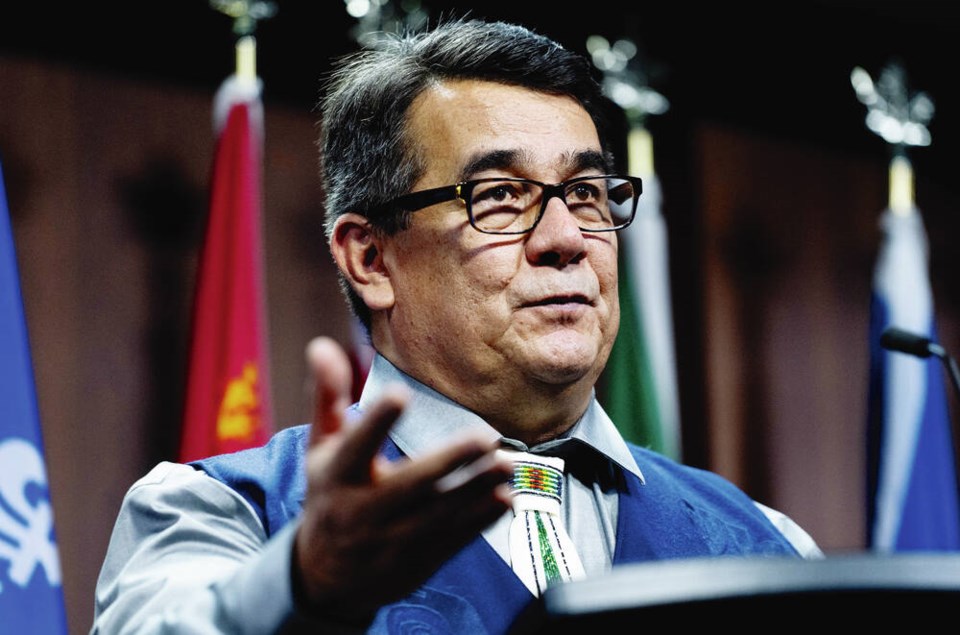A diverse alliance whose members have often been at loggerheads are united in demanding the prime minister keep a promise he made five years ago to end by 2025 open-net fish pens in B.C.
“It’s not unreasonable to think that the primary role of the Fisheries Department is to look after the environment and wild salmon,” said Bob Chamberlin, chair of the First Nation Wild Salmon Alliance.
“We have an unprecedented presence of unity across B.C., including more than 100 First Nations, commercial and sport fishermen, tourism operators, scientists and NGOs.
“Prime Minister [Justin] Trudeau, we implore you to keep your promise to ensure DFO looks after its primary responsibility, not the cabal of multinational corporations that are infesting our waters and killing a way of life for First Nations and British Columbians.”
Trudeau made his pledge during the 2019 election campaign.
According to the Alliance, 120 First Nations and 75 per cent of British Columbians are against open-net salmon pens.
The prime minister ordered a “responsible plan” in 2019 for the Fisheries Department to work with First Nations and the province to transition away from open-net salmon pens by 2025, but the Alliance members are worried that as that date nears, nothing is being done.
“If we stop putting up barriers, the salmon will survive, they well come back,” Chief Don Svanvik of Namgis First Nation said. “This was the prime minister’s mandate and no work has started.
“It’s the 11th hour, nearing midnight, all the science has been done.”
The Alliance’s concern is that pests such as sea lice and diseases from open-net pens infect wild salmon making their way to sea.
Chief Darren Blaney of Homalco First Nation — People of the Rapids in and around Discovery Islands — compared the loss of wild salmon to residential schools trying to strip First Nations of their identity.
“When we lose our salmon, we lose our culture,” he said. “We lose our teachings.”
Seventeen First Nations have formal fish-farming agreements, employing more than 500 Indigenous people and spinning $50 million a year in direct economic benefits, according to the Coalition of First Nations for Finfish Stewardship.
“The coalition is forced to once again reiterate that the remaining salmon farms in B.C. operate in our traditional territories and in partnership with our Nations,” spokesman Isaiah Robinson, deputy chief of Kitasoo Xai’xais Nation, said.
“Any decision regarding the transition and future of salmon farming in our respective territories will be made by those rights-holder Nations with strength of claim,” which is a provincial government guide for consulting with First Nations.
“One hundred per cent of B.C. farmed salmon is raised in partnership with coastal First Nations,” Robinson said. “The direct influence this has on the social health and economies of our communities can not be emphasized enough.
“We know that a responsible transition can happen if our Nations are at the table, providing our own oversight, traditional knowledge, Indigenous-led science, economic participation, and leadership in salmon farming in our territories.”
Members of the opposition Alliance argue that the international companies that own the fish farms can not be counted upon to be responsible stewards even with First Nations oversight, and that if the pens are removed salmon runs would rebound.
Sean Jones, a lawyer with MacKenzie Fujisawa LLP, compared salmon pens to industrial chicken and cattle farms.
“I have one question for Prime Minister Justin Trudeau, will you keep your promise?” he said. “It was a promise based on common sense — industrial-scale agriculture spreads disease like swine flu, bird flu, mad cow disease.
“We don’t put cattle on caribou trails, we don’t put poultry farms near aviaries, we absolutely should not have millions of Atlantic salmon on migratory routes of endangered Pacific salmon.”
Sonia Strobel, CEO and co-founder of Skipper Otto, an association of independent fishing families, said 8,000 people across Canada depend on wild salmon for their way of life.
“Since salmon farms were brought into our waters we’ve seen a steady decline in wild salmon numbers, as we’ve been talking about here,” she said. “And this has happened everywhere in the world.
“Yes, salmon farms create jobs, but not nearly as many as thriving wild salmon populations.”
As was pointed out at the press conference, adversity can make for strange bedfellows.
“I’d love to be in a position where we’re fighting over [access to] salmon again,” Tyrone McNeil of the Sto:lo tribal council said, referring to past clashes with commercial and sports fishers. “Foreign corporations have foreign interests.
“They have nothing to lose and everything to gain; we have nothing to gain and everything to lose.”



